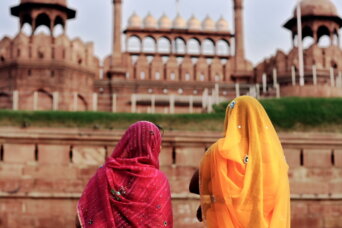- About
- Topics
- Picks
- Audio
- Story
- In-Depth
- Opinion
- News
- Donate
- Signup for our newsletterOur Editors' Best Picks.Send
Read, Debate: Engage.
| topic: | Women's rights |
|---|---|
| located: | India |
| editor: | Tish Sanghera |
Inspired by the global campaign against sexual harassment, the #MeToo movement shook India in 2018. But while the country saluted the brave women sharing stories of assault and generating much needed discourse about consent, a recent judgement in a rape case has revealed that not much has really changed in the country.
The case centres around a female journalist who accused Tarun Tejpal, an editor at Tehelka (formerly one of India’s best known magazines) of sexually assaulting her in Goa in 2013. The controversy, however, comes not from Tejpal’s acquittal (though it had surprised many, given there’s apparent evidence that he initially apologised for his actions in emails to the journalist), but rather from the judgement given by a High Court judge, Kshama Joshi.
Joshi’s judgement reads like a piece of character defamation, as if the victim’s own morality is on trial. In the over 500 page-long ruling, Joshi lays bare intimate details from the victim’s private life, such as her past sexual relationships, friendships with men and preference for drinking on occasion as reasons why her testimony is untrustworthy. Not only is this framing misogynistic, it is horrifically regressive - a frustratingly outdated portrayal of the ideal Indian woman.
Activists and former law enforcement officials have also decried the way the judge suggested that the victim did not behave in the “normal” way that a rape victim should - as if there is a recognised, singular response to such trauma. For instance, the judge suggests that because the victim retained her composure and was neither visibly “terrified nor traumatised”, and did not immediately report to the police, the victim is lying. In the Judge’s views, a rape victim should be visibly broken, ignoring the fact that the journalist (who was at a work event) had to maintain her composure in order to keep her job.
It is disappointing that a judgement that fails to protect women and upholds patriarchal stereotypes was delivered by a woman. It shows that centuries of socio-cultural conditioning is deeply entrenched in society’s psyche, regardless of gender. Activists warn that the judiciary needs urgent training on feminst issues and perpsectives, and that this is central to ensuring that rape survivors receive a fair trial.
More frustrating still is that even after a spate of recent, similarly problematic rape judgments have shone a light on this issue, the pattern continues. After a judge in a case last year said the victim could not have fallen asleep after being raped because that would be “unbecoming of an Indian woman,” 17 civil society organisations wrote an open letter to the judge. They said he had “deeply disturbed and disappointed those of us who have been working over the past decades to uproot the discriminatory structures of patriarchy deeply embedded into all our social and political systems including the judiciary.”
Time and time again, it seems that it is constantly the victim’s actions that are closely interrogated, rather than the perpetrator’s crime.
After a backlash against this most recent judgement, the Goa state government has ordered Tejpal’s case to be reheard. But while this is good news for the journalist and her quest for a fair hearing, the events may have enacted more widespread damage. How likely are Indian women now to report sexual assault given the way this female journalist has been shamed, ridiculed and maligned? While #MeToo was a brief leap forward in recognising the lived experiences of Indian women, this judgement constitutes a massive step backwards.
Image: carlos.

